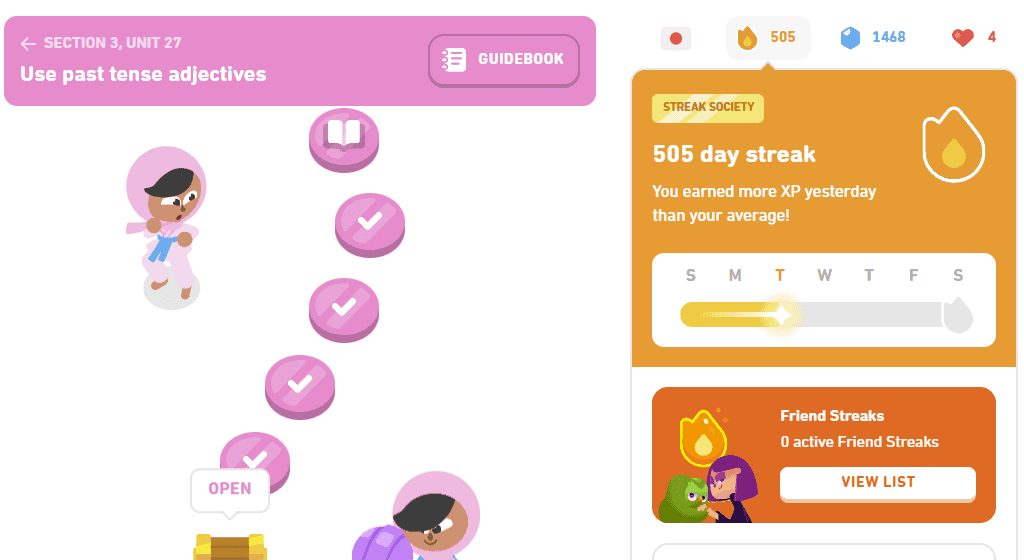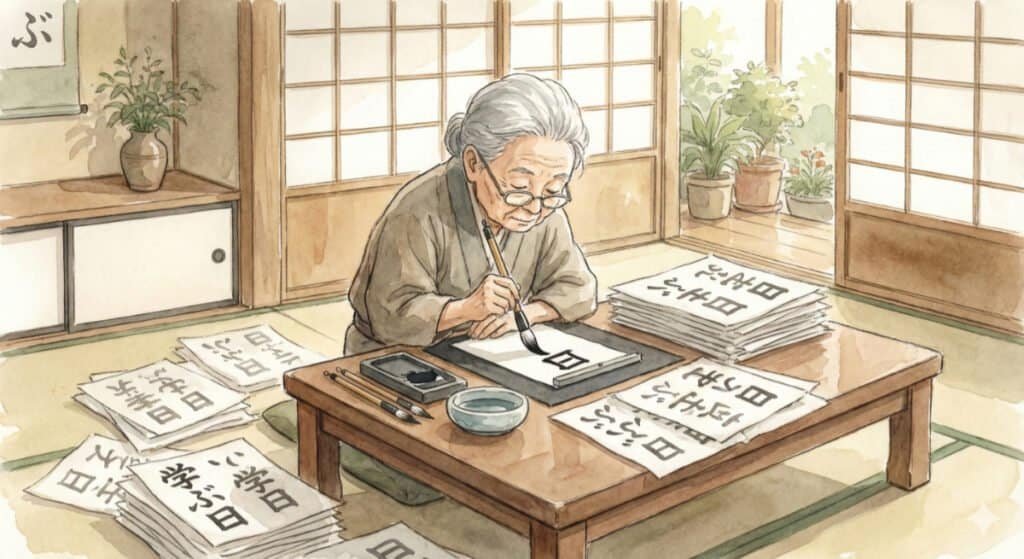The Passion Myth I Believed
For years, I assumed you needed to feel passionate about something before starting to learn it. That burning desire was supposed to come first, pulling you toward the guitar, the new language, the skill you’d master.
So I waited. And waited. And never felt that fire about most things.
Turns out, I had it backwards.
Table of Contents
Day 505 of Something I Never Felt Passionate About
This morning marked day 505 of my Duolingo streak for Japanese. That’s 505 consecutive days of practicing a language I still don’t feel particularly passionate about. I started it during a difficult transition. Not because I suddenly developed a burning desire to master Japanese, but because I needed something small and achievable to focus my mornings.

Five minutes a day. That’s it. Some days I’m engaged, most days it’s just routine. But here’s what surprises me: I’m actually progressing. I can answer grammar questions I haven’t practiced in weeks. The language is starting to stick, not through passion, but through showing up.
The passion? Still not there. The appreciation for what consistency builds? Absolutely.
Have you ever gotten good at something you never felt passionate about?
The Tractor Story
When I started farming in Japan, it wasn’t passion that drew me to it. My boss closed his English school and invited me to join his family’s farming operation. I said yes out of loyalty, not because I’d always dreamed of agricultural work.
The first few months were good. Exercise, teamwork, honest work for good people I respected. But becoming skilled with heavy machinery? That took some hours of repetitive practice. The same movements, the same careful maneuvering, the same concentration required day after day.
No passion ever showed up for driving tractors. What did show up was competence, and with competence came something unexpected: a little bit of pride.
Now when I’m operating farm equipment, there’s genuine satisfaction in doing it well. It feels manly, requires real responsibility, and marks me as someone skilled in this particular craft. None of that existed on day one. It built itself through repetition I never particularly felt excited about.
What skill surprised you by becoming meaningful through practice rather than passion?
Teaching English Without the Calling
My teaching career started accidentally, too. Someone needed English lessons and asked if I’d help. I said yes. Not because I felt called to teach, but because someone asked and I was willing.
No teaching passion. No sense of calling. Just willingness and a natural drive to help people learn to express themselves better.
Twenty years later, I’m still teaching across different schools. Students trust me with personal thoughts and problems, which helps us dive deeper. That trust didn’t come from passion. It came from showing up consistently and genuinely caring about their growth and doing a good job and helping the team. In the early days, there was never a passion that other established teachers described.
The work became meaningful through doing it, not before it.
The Blog Journey
Even blogging started without passion. When I first came to Japan, I had plenty of free time and thought watching videos about web development seemed productive. Learning Adobe GoLive back then made me feel like a nerd. It was the first time I’d studied seriously at a computer rather than just using them for work or games.
I’m not sure I ever knew I had “skills” in blogging. I simply retained the knowledge and found myself enjoying the processes involved, like the writing, the tweaking, and the satisfaction when something connects with readers.
None of my blogging projects started with a burning enthusiasm. But they developed meaning by just showing up and building them.
What did you start without a passion that turned out for the best?
What Happens When You Show Up
Here’s what I’ve noticed across languages, farming, teaching, and writing: Becoming competent at something motivates you to continue.
You don’t need passion to start. You need willingness to begin as best you can, do the boring foundational work, and continue when progress feels like an uphill struggle. The confidence that comes from getting better, even at things you never felt excited about, often generates something that looks a lot like passion eventually.
Some of my most usuable skills started as:
- Survival tactics (Duolingo after a difficult period)
- Obligations (farming for my boss)
- Simple curiosity (website building)
- Willingness to help (teaching)
None began with that magical feeling I thought was required. All developed into sources of pride, connection, and meaning through consistently showing up.
The Question I Ask Now
I’ve stopped asking “Am I passionate about this?” before starting something.
Now I ask: “Can I do this for 15 minutes today?”
That’s it. Lower the bar. Make it achievable. Don’t wait for the feeling. Focus on the action.
The guitar scales you practice until they’re second nature. The weights you lift that don’t change week to week. The lines of code you write over and over. The language practice that feels routine more than exciting.

That boring, repetitive work? It’s the foundation everything else builds on. The part nobody sees. The part that makes the difference between dabbling and developing actual skill.
What can you try if you stop waiting to feel passionate about it?
The Unexpected Reward
The strangest part about all this: some things I developed competence in eventually did spark something like passion. Not all of them, but some.
Teaching grew into genuine care for students’ progress. Farming connected me to satisfaction I didn’t know I needed. Writing became a way to process life that feels essential now.
But even the skills where passion never arrived, like Japanese language study, they still matter. They prove I can commit to something, show up consistently, and build capability even when motivation is absent.
That might be more valuable than passion ever was.
The Honest Invitation
This isn’t about having it all figured out. It’s about sharing what actually happened when I stopped waiting for passion before learning new things.

If you’re waiting for that burning desire to strike before picking up the language, the instrument, the hobby, maybe try starting without it. See what 15 minutes a day for a few weeks builds. Notice whether competence creates its own momentum.
The feeling you’re waiting will likely come from just showing up and doing something. It doesn’t need to be there before you start.

What skill have you been putting off because you don’t feel passionate about it? Or what did you get surprisingly good at without ever feeling particularly excited? Sometimes the most usable skills we learn start without any passion at all.
Share your thoughts below.





